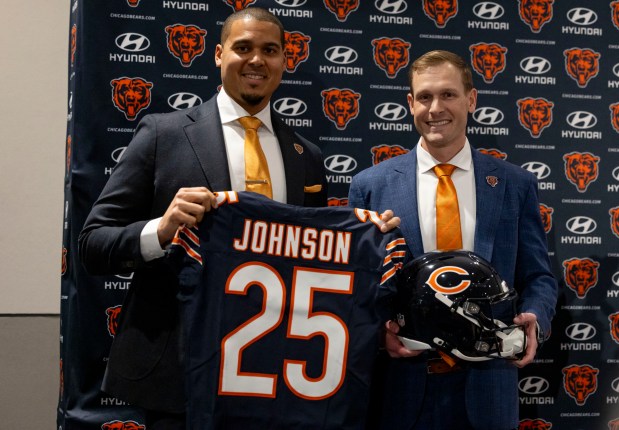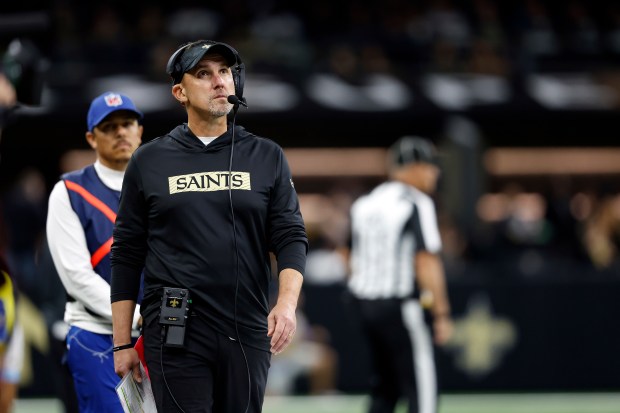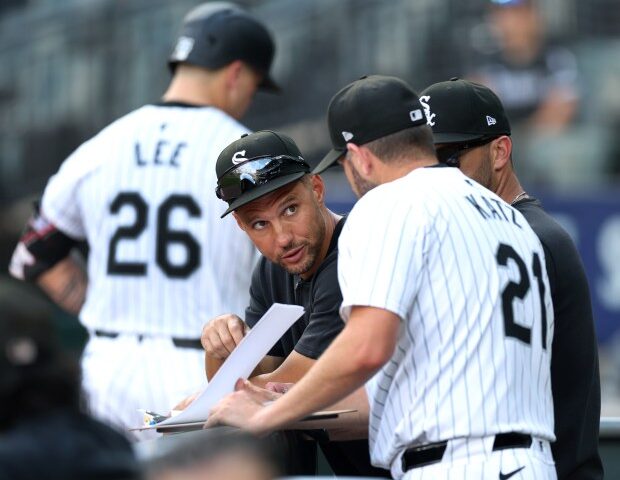The jubilation still was spreading through Halas Hall last month as the Chicago Bears celebrated their energizing change of direction. Ben Johnson’s arrival as the new coach created a swell of optimism at team headquarters.
Johnson, who oversaw the NFL’s most productive offense last season and was honored during Super Bowl week as the league’s Assistant Coach of the Year, arrived in Lake Forest with proven credentials and grand ambition. And, naturally, that again opened the doors of imagination as it relates to the Bears’ opportunity to become a championship contender.
Furthermore, Johnson’s hiring came less than nine months after the Bears used the No. 1 pick in the 2024 draft on promising quarterback Caleb Williams. Thus it’s easy to understand why the union between Johnson and Williams has created such positive intrigue.
But asked last month how it felt to land the coaching candidate most Bears fans wanted, a year after grabbing the quarterback so many coveted, team Chairman George McCaskey just smiled.
“Now,” McCaskey said, “all we have to do is what everybody (really) wants. And that’s win.”
Oh, yeah. That.
The Bears haven’t mastered that part of the equation for a very long time. They have a dreadful .294 winning percentage under the guidance of general manager Ryan Poles and haven’t won a playoff game since McCaskey became chairman in 2011. They’ve posted only two winning seasons in that span while finishing in last place in the NFC North seven times and firing five head coaches.
Still, Johnson bounced into Halas Hall last month expressing confidence a rapid turnaround is possible.
“Our mission, starting this spring,” he said, “is to win and to win now. I get goosebumps right now just thinking about being the head coach of the Chicago Bears. I know exactly what this role and this responsibility requires. And I cannot wait to get to work.”
From the jump, Johnson leaned into the excitement and expectation with an understanding of how much heavy lifting is required to attain his goals. His work started in late January with building a coaching staff and will continue over the next nine weeks with building the roster. Johnson’s focus then will shift toward building a successful offense before intensifying the mission of building a winning culture at 1920 Football Drive.
That’s a whole lot of building ahead. A whole lot of tools, supplies and time will be needed. And as the Bears arrive at the scouting combine in Indianapolis this week, most of Johnson’s projects remain in the early stages with so much still to learn about his vision and methodology.
Staff meeting
The official announcement of Johnson’s 2025 coaching staff came Thursday, a roll call of 28 assistants that includes two newcomers in the defensive and offensive coordinator positions with disparate experience.
Dennis Allen, 52, will take the reins of the Bears defense, offering eight seasons of experience in that role plus two stints as a head coach that should help him serve as a sounding board for Johnson.
New offensive coordinator Declan Doyle, meanwhile, is just 28 years old, less than six years removed from graduation from the University of Iowa and still working to feel out what Johnson will need most from him.
Johnson detailed at his introductory news conference last month that, as he tends to play-calling duties for the offense, he’ll want his coordinator to be an organized, structured, late-night grinder who can become a resource during the season in setting the table early in each game week.
“Ben is going to have less time than he’s ever had as a play caller,” Doyle said. “My job is really going to be to organize and detail the game plan initially while utilizing our staff. Everybody will have different assignments with how we’re going to build this thing schematically as we attack a defense.
“Basically, I’ll have to do that work that he’s not going to have time to do. And he’s going to have to be able to trust me that I’m going to give him the correct information he needs as a decision maker.”
Trust in the coaching staff is a prerequisite for Johnson’s Year 1 success. The Bears are optimistic he has formed a group that includes several highly respected, established leaders, most notably assistant head coach/wide receivers coach Antwaan Randle El and running backs coach Eric Bieniemy.
Defensively, the presence of passing game coordinator/defensive backs coach Al Harris should be similarly beneficial in getting that side of the ball up and running.
Plan of attack

With his coaching staff now in place, Johnson must crystallize his vision for the roster with general manager Ryan Poles. The free-agency negotiating window opens in less than two weeks, and they will enter that period with ample salary-cap room — currently projected at about $80 million — to make as big a splash as they want. They also have eight selections in the April 24-26 draft, including four in the top 75.
There’s a golden opportunity to add a handful of immediate difference makers. But that will hinge in part on how quickly Johnson and Poles turn their collaboration into direction, agreeing upon their biggest needs and how best to address them.
Across the league, the presumption is the Bears will make every effort to significantly upgrade their offensive line. That’s a well-known problem area and one Johnson spoke about last month.
“It’s something Ryan and I have already talked about,” he said. “We will develop a plan of attack for how to get that done.”
Pretty soon, that attack must occur. The Bears also have needs up front on defense and will be looking to add more playmakers and depth to the roster.
Poles shares Johnson’s optimism that significant improvement can happen quickly.
“We can do some damage to get this team where it needs to be,” Poles said.
‘The fire in his eyes’
In his initial meetings with Johnson, Williams said he was struck immediately by the juice he could feel from his new coach and play caller.
“You can see the competitiveness in his eyes. The fire in his eyes,” Williams said. “It was really cool seeing that.”
While questions will be asked regularly over the next six months as to how Johnson’s offense is being built and progressing, the coach has referred to it repeatedly as his quarterback’s offense, determined to mold the playbook to Williams’ liking and around his greatest gifts.
That’s no small deal as the Bears envision a significant breakthrough from Williams in his second season. It also will require Williams and Johnson to quickly forge a bond, with each needing to understand how the other views the game.
“It’s time on task. It’s trust,” Johnson said. “I’ve talked to Caleb. We’re going to have to spend a lot of time together.
“The play caller and the quarterback have to be integrated. The quarterback needs to be able to see the game through the play caller’s eyes. In my opinion, that’s the only way it works.
“So we’re going to spend a lot of time together this spring and certainly during training camp and we’ll be able to see how much headway we can make.”
Culture club
In early April, afforded the league’s “new coach minicamp,” the Bears will lift the curtain on their first team meetings and on-field workouts. In those early stages, Johnson will aim to make the core principles of his program crystal clear. Those will be his first efforts in building the atmosphere he wants.
Already, Johnson has vocalized his desire to create a locker room that thrives on a team-first mentality while understanding the coaching staff’s demands for clear communication lines, discipline and professional integrity.
Johnson also has made it clear he plans to immediately establish a system of accountability. And while every new coach makes that vow in the early stages, the key will lie in not just talking about accountability but seeing it through.
To that end, Johnson was asked last month how he defines that all-important concept that is too often overlooked.
“Accountability,” Johnson said, “is really just, ‘We’re going to do what we say we’re going to do and we’re going to be who we say we’re going to be.’ And if we fall short of that standard, then there has to be consequences to that. That can look a number of different ways.”
Ultimately, Johnson said, he envisions a time when his locker-room leaders will be in charge of policing accountability.
“Until we get there, though,” he said, “it’s going to be on us as the coaching staff to outline what it should look like, what a Chicago Bear is going to look like, what that professional work ethic is going to look like.”
All such processes take time. And significant effort. And full buy-in. But the building process has begun.




